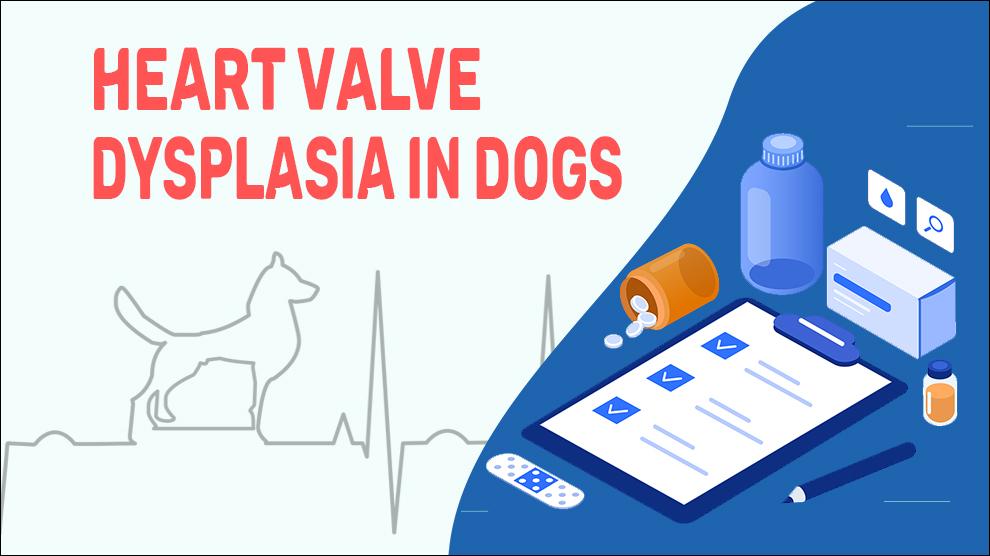What Is Heart Valve Dysplasia In Dogs?
The term "Dysplasia" refers to the “development of tissues, cells or organs that is not normal”. Heart valve dysplasia (HVD) refers to congenital malformation in one of the heart valves.
The heart of a dog is divided into 4 chambers such as 2 atria and 2 ventricles; separated by a wall and there are two valves. The valve on the left side of the heart is called the mitral valve, while the valve on the right side of the heart is called the tricuspid valve. Atrioventricular (AV) valves are valves that separate the top chambers from the bottom chambers. The pulmonary valve separates the right ventricle (lower right heart chamber) and the pulmonary artery (the artery that delivers blood to the lungs).
Heart valve dysplasia is a non-inflammatory progressive worsening that usually affects the valves in the heart. Ultimately, the hardening and outflow of the valves cause’ heart enlargement with ensuing deterioration of the heart muscle.
The malfunction of the valves results in an unusual backward flow of the blood through the valve and when the blood is not going where it should, it is called regurgitation. When the heart cannot rectify and support the unusual blood flow, this may lead to congestive cardiac failure.
Symptoms Of Heart Valve Dysplasia In Dogs
- Increased respiratory rate
- Rapid/shallow or Labored breathing
- Weakness
- Collapse or fainting
- Slow / fast / erratic heart rate
- Exercise intolerance
- Lack of appetite
Treatment Options For Heart Valve Dysplasia In Dogs
For Mild Cases:
Physical therapy, pain medication, heart supplements, and making sure the affected dogs do not become overweight.
NSAIDs like -
- Carprofen (Rimadyl, Canidryl, Rimifin, Vetprofen).
- Meloxicam (Metacam, Muvera, Mobic).
- Firocoxib (Previcox, Equioxx).
- Deracoxib (Novartis).
- Etodolac (EtoGesic, Lodine).
Pain-relieving medications like tramadol, gabapentin, amantadine, etc may be prescribed by veterinarians to alleviate the suffering of the dog.
Diuretics (water pills): This helps to decrease the buildup of fluid in the body by removing extra salt and fluids. Furosemide - Salix, Lasix, Frusemide, Uritol, etc.
Congestive heart failure - Most commonly used drug category is angiotensin-converting enzyme (ACE) inhibitors (ramipril, benazepril, enalapril, or lisinopril).
Surgical replacement of the valve: porcine valve (pig valves) replacements.
Home Remedies For Heart Valve Dysplasia In Dogs
- Home remedies such as medications, exercise options, and diet will be based on your dog’s age and severity of the disease.
- Weight management is a matter of concern for HVD. Several studies have shown the connection between the increased risk of heart diseases and being obese.
- Work with your vet to find the optimal dietary plan for your dog.
How To Prevent Heart Valve Dysplasia In Dogs?
Heart valve dysplasia etiology is still unknown. Specific causes are not yet identified. The most speculated reason is hereditary in some breeds and it is better to check the affected dogs when breeders think about breeding or when you get a dog from a susceptible lineage.
Affected Dog Breeds Of Heart Valve Dysplasia
Bull Terrier, German Shepherd, Golden Retriever, Great Dane, Newfoundland, Mastiff, Boxer, Cavalier King Charles Spaniel, Chihuahua, Cocker Spaniel, Doberman Pinscher, Lhasa Apso, Old English Sheepdog, Toy Poodle, Samoyed, Schnauzer, Yorkshire Terrier
Causes, Diagnosis, And Prognosis For Heart Valve Dysplasia In Dogs
- Cause:
- Congenital
- Mortality:
Overall, Heart valve dysplasia is serious and brings about life-threatening complications without proper treatment. Heart valve dysplasia is the reason for high cardiovascular mortality in dogs.
- Diagnosis:
- A complete blood count (CBC), Chemistry profile.
- Abdominal Ultrasound.
- Cardiac biomarker blood test - NTproBNP
- X-ray
- ECG (electrocardiograph) / Echocardiogram
- Prognosis:
The prognosis for recovery of heart valve dysplasia surgery is excellent, with most of the dogs recovering completely after suitable treatment.
Veterinary cardiologists say that severe heart valve dysplasia affected dogs will be also having other defects of the heart that are likely to have developed concurrently with the defect itself.
Severely affected dogs will start to manifest symptoms within the first year of life. For HVD dogs, Congestive heart failure may develop once the heart cannot hold longer the unusual flow of blood.
When To See A Vet For Heart Valve Dysplasia In Dogs?
Contact your vet right away, if you notice:
- Rapid and shallow breathing.
- Collapse or fainting
- Slow/fast/erratic heart rate
Food Suggestions For Heart Valve Dysplasia In Dogs
- Lean, home-cooked meats (chicken, turkey, beef, fish).
- Beef, fish like tuna, and dairy products - milk and cheeses.
- Low-sodium cheese (Look for the Heart Healthy labeling).
- Plant-based protein sources - Lentils, Chickpeas, Potatoes, other Nuts, and Seeds.
- Fresh vegetables/fruit (green beans, carrots, banana, apple, orange).
- Cooked spinach and potatoes.
- Raw meaty bones, raw lamb flaps, or chicken wings.
Conclusion
Heart valve dysplasia in dogs is a non-inflammatory, progressive disease that affects the dog’s heart health and can limit its lifestyle. The present treatment modalities are targeted at treating the pain and decelerating the progression of the disease.
So, earlier detection of this progressive heart condition is the best option to begin a positive treatment plan.

















